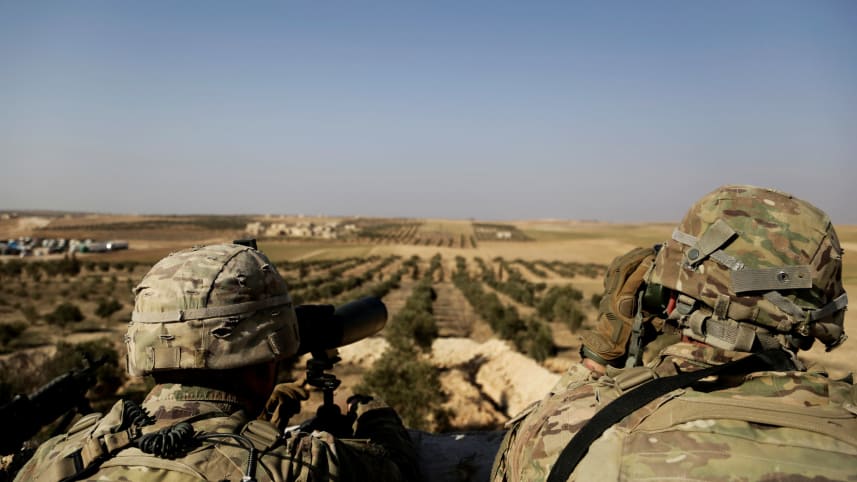Analysis/Biggest Challenge Facing New Israeli Army Chief: A Wild Card Thousands of Miles Away
عاموس هاريل من الهآرتس: التحدي الأكبر الذي يواجه رئيس الأركان الإسرائيلي الجديد هو وضغ شاذ على بعُد ألآلاف الأميال من بلاده
Amos Harel/Haaretz/January 19/19
How the attack that killed U.S. forces in Syria could affect Trump’s pullout ■ The question of Iran’s nuclear program is set to make a comeback
The strategic reality facing the new chief of staff of the Israel Defense Forces, Lt. Gen. Aviv Kochavi, will depend largely on one factor – the political situation in the United States. More precisely, it will depend on the vagaries of U.S. President Donald Trump.
At the outset of 2019, the Trump administration continues to convey uncertainty and instability. The amount of news generated by the president in one week, like this past one, is equivalent to several months’ worth with previous presidents.
Trump hunkered down in the White House, telling interviewers that he hadn’t emerged in months, forgetting for a moment his frequent trips. He’s up to his neck in the crisis resulting from the government shutdown, continuing with his promises to build his wall on the Mexican border.
But the latest crisis is only a symptom. The deluge of headlines in recent days included the following.
The FBI investigation into Trump began right after he was sworn in two years ago, on suspicions he was a spy or acting on Russia’s behalf. There was a report he was considering an American withdrawal from NATO, an idea whose very mention sends shivers down the spines of strategic experts, Democrats and Republicans alike. There was also news of a secret plan initiated by the national security adviser, John Bolton, for attacking targets in Iran.
From Israel’s perspective, Trump’s Middle East policies will be affected by two interconnected factors: progress by Special Counsel Robert Mueller and the balance of power between the United States and Russia. The shattering of norms in Washington may get worse with the Democratic-led House of Representatives promoting further embarrassing investigations into Trump. It seems that, under pressure, the president will act even more erratically than during his first two years in office.
The president will have an even shorter attention span when it comes to foreign affairs. With the removal of any remaining restraints – after the withdrawal of generals John Kelly as White House chief of staff and Jim Mattis as defense secretary – Trump may be tempted to take strategic gambles to deflect attention from his legal troubles at home.
The timetable for implementing Trump’s decision to withdraw from Syria is still unclear. In recent trips to the Middle East by Bolton and Secretary of State Mike Pompeo, there was mention of a process that would take months. The evacuation of the American base at al-Tanf in southern Syria, near the borders with Iraq and Jordan, could take even longer.
This is viewed in Israel as critical because the U.S. presence there is seen as an obstacle against creating a land bridge from Tehran to Iraq, Syria and on to Beirut. On the other hand, Trump is sticking to the principle of withdrawing. It’s possible that this week’s attack by the Islamic State, in which four American soldiers died in the Kurdish town of Manbij in northern Syria, will give him another reason to speed up the exit of U.S. troops.
IDF Chief of Staff Gadi Eisenkot, who ended his term this week, began his tenure in February 2015 amid hopes that the big powers’ negotiations with Iran over a nuclear accord would end well. A deal was then signed in July of that year, sending Prime Minister Benjamin Netanyahu into shock.
The IDF actually saw it in a positive light. This was a dramatic turning point, giving Eisenkot an interlude for launching the multiyear Gideon plan, whose main component was the diversion of resources from preparations for attacking Iran. Instead, Israel would contend with challenges closer to home such as Hezbollah and Hamas.
A second strategic turning point followed almost immediately, in September 2015, with the dispatch of two Russian fighter squadrons to help the Assad regime in Syria. This gift to Bashar Assad from Vladimir Putin not only tipped the scales in the civil war and saved the Syrian tyrant, Russia’s cooperation with Iran on Assad’s behalf accelerated Iranian moves to dig in militarily in Syria while smuggling weapons to Hezbollah in Lebanon.
This was confronted by the IDF, under Eisenkot, with considerable success. Last weekend’s news of airstrikes on thousands of targets in Syria wasn’t very informative. First, neither the targets nor the achievements were disclosed. Second, since Syria’s accidental downing of a Russian spy plane in September, Israel has reduced its number of strikes and is now meticulously avoiding areas near Russian bases in northwestern Syria.
Netanyahu, in his speech during the chief-of-staff changeover Tuesday, stressed again his real interest: Iran, Iran and Iran. Eisenkot focused his efforts on contending with Iran in Syria not terribly far from the Israeli border.
Trump’s decision to withdraw from the nuclear accord, with Netanyahu’s vigorous encouragement, raises anew the problem of Iran’s nuclear program. It’s likely that Netanyahu will again ask the military to upgrade its operational plans to contend with this problem, which requires a considerable investment of resources. Kochavi must now craft a new multiyear program, taking into account new directions laid out by Netanyahu in the context of an unpredictable regional and international situation.
Trump’s future is a big unknown factor in this equation. The Israeli political arena, with an election coming up on April 9, followed by what looks like a corruption indictment against the prime minister, doesn’t herald much stability or certainty.




















